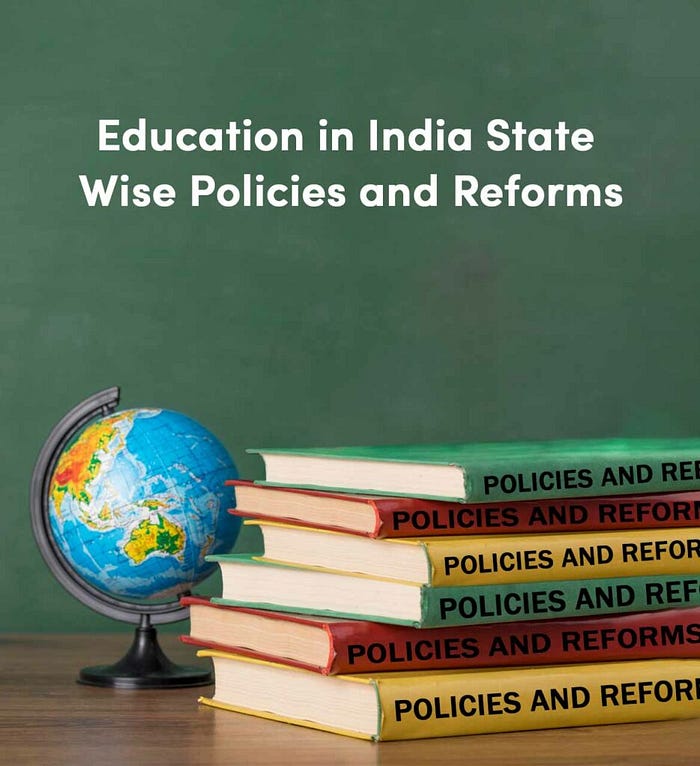
Education in India has been an integral part of its social and economic fabric for centuries. The country has a rich legacy of learning and knowledge dissemination dating back to ancient times. However, the present educational scenario in India is not up to the mark, and it has become a matter of concern. The education system in India needs to be revamped to meet the needs of the 21st century with somebest online education platform in India.
Importance of State Policies and Reforms
The education system in India is managed by both central and state governments. While the central government plays a significant role in setting policies and guidelines, the state governments are responsible for implementing them. Therefore, state policies and reforms are critical for the success of the education system in India.
Purpose of the Blog
This blog aims to provide an overview of education in India state wise policies and reforms, and their impact. It will also examine the challenges faced in implementing these policies and reforms and suggest possible solutions for the future.
Overview of Education in India State Wise Historical Perspective
The Indian education system has undergone significant changes over the years. Education was a privilege restricted to a few in ancient times. The British introduced a modern education system in India in the 19th century, which was aimed at producing a class of clerks and administrators to serve their colonial interests. After independence, the Indian government made significant efforts to democratize education and make it accessible to all.
Current Status
Despite the progress made, the education system in India is still grappling with several challenges. Some of the significant issues include low literacy rates, inadequate infrastructure, lack of quality education and resistance towards accepting online education platform.
Challenges
The education system in India is plagued by a multitude of problems, such as low enrolment rates, poor quality of education, inadequate funding, lack of adequate infrastructure, and a missing approach for personalized learning.
Andhra Pradesh
Policy Initiatives
The Andhra Pradesh government has initiated several policy initiatives to improve the education system in the state. One of the significant policies is the ‘Mana Badi Nadu Nedu’ program, which aims to provide infrastructure facilities in government schools.
Reforms
The Andhra Pradesh government has also implemented several reforms to improve the quality of education in the state. The ‘Amma Vodi’ scheme, launched in 2019, provides financial assistance to mothers to send their children to school.
Bihar
Policy Initiatives
The Bihar government has implemented several policy initiatives to increase enrolment rates and improve the quality of education. One of the significant policies is the ‘Bihar Student Credit Card Scheme,’ which provides loans to students for pursuing higher education.
Reforms
The Bihar government has also taken several steps to improve the quality of education in the state. The ‘Unnayan Bihar’ program aims to improve the quality of education in government schools by providing better infrastructure, equipment, and teaching staff.
Delhi
Policy Initiatives
The Delhi government has initiated several policy initiatives to improve the education system in the state. The ‘Chunauti’ program aims to improve the learning outcomes of children in government schools.
Reforms
The Delhi government has also implemented several reforms to improve the quality of education in the state. The ‘Happiness Curriculum’ aims to impart value-based education to mentees to help them lead a happy and fulfilling life.
Gujarat
Policy Initiatives
The Gujarat government has initiated several policy initiatives to improve the education system in the state. The ‘Gujarat State Education Policy 2020’ aims to provide quality education to students and make them employable.
Reforms
The Gujarat government has also taken several steps to improve the quality of education in the state. The ‘Mission Vidya’ program aims to improve the learning outcomes of children in government schools by providing additional support and resources to mentors.
Kerala
Policy Initiatives
The Kerala government has initiated several policy initiatives to improve the education system in the state. The ‘Samagra Shiksha Kerala’ program aims to provide inclusive and equitable quality education to all children.
Reforms
The Kerala government has also implemented several reforms to improve the quality of education in the state. The ‘Hi-Tech School’ project aims to provide technology-enabled education to mentees to help them acquire the necessary skills for the 21st century.
Comparison of State-Wise Policies and Reforms
All the states have implemented various policies and reforms to improve the education system in their respective states. Some of the strengths include a focus on quality education, infrastructure development, and inclusive policies.
One of the significant weaknesses is inadequate funding for the education sector. Other weaknesses include a lack of political will and poor implementation of policies and reforms.
There are several opportunities to improve the education system in India, such as the use of technology, teacher training programs, and public-private partnerships.
The major threats to the education system in India include a lack of awareness and participation of parents, a widening gap between rural and urban education, and an increasing emphasis on rote learning.
Impact of State-Wise Policies and Reforms
The policies and reforms have had a positive impact on the academic performance of mentees in several states, such as Kerala and Delhi.
The policies and reforms have led to an increase in enrolment rates in several states, such as Bihar and Andhra Pradesh.
The literacy rates have improved in several states, such as Kerala and Gujarat, due to the policies and reforms.
The quality of education has improved in several states, such as Delhi and Andhra Pradesh, due to the policies and reforms.
The policies and reforms have also led to an improvement in the employability of mentees in several states, such as Gujarat and Kerala.
Challenges in Implementing State-Wise Policies and Reforms
The lack of political will is one of the major challenges in implementing policies and reforms in the education sector.
Inadequate funding is another significant challenge that affects the implementation of policies and reforms in the education sector.
Poor implementation of policies and reforms is a common challenge in several states.
Resistance to change is another significant challenge that affects the implementation of policies and reforms in the education sector.
Limited participation of parents and community members is a significant challenge that affects the implementation of policies and reforms in the education sector.
Future of Education in India State Wise
Some of the emerging trends in the education sector in India include the use of technology, personalized learning, and a focus on skill-based education.
There are several possibilities for the future of education in India, such as increased participation of the private sector, increased use of technology, and a focus on skill-based education.
Some of the recommendations for improving the education system in India include increased funding, better teacher training programs, and increased participation of parents and community members.
Conclusion
The education system in India is facing several challenges, but the state governments have implemented various policies and reforms to improve the situation. While there are strengths and weaknesses in these policies, there have been positive impacts on academic performance, enrolment rates, literacy rates, quality of education, and employability. However, challenges such as a lack of political will, inadequate funding, poor implementation, resistance to change, and limited participation continue to impede progress.
Implications for Education in India State Wise
The policies and reforms implemented by different states provide valuable lessons for the education system in India. The strengths and weaknesses of these policies and reforms highlight areas that need to be improved to ensure that every child receives a quality education.
Final Thoughts
The education sector in India is complex, and the policies and reforms implemented by different states reflect the diversity of the country. While there is progress, there is a long way to go to ensure that every child in India receives a quality education. It is essential to continue to prioritize education and work towards improving it. With all the policies and reforms, now the innovation of technology in the education sector has offered various online teaching platform in India to empower the mentors.
Originally published at https://blogs.dynamind.co on April 11, 2023.
